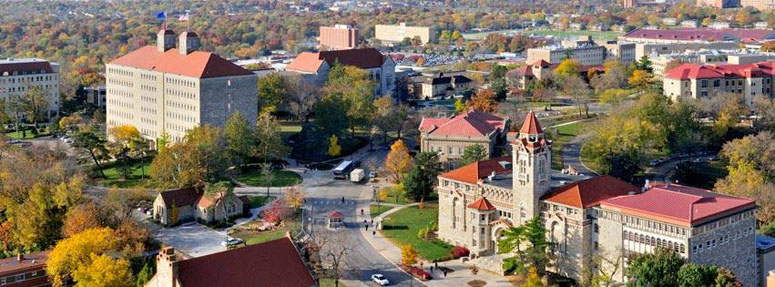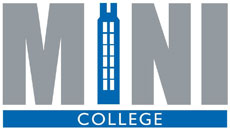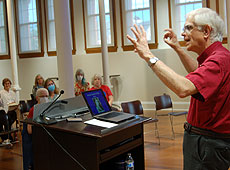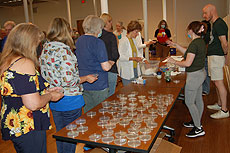The following speakers will make presentations at this year’s Mini College. All presentations will be virtual (online) and delivered live, with opportunities for questions and answers. They also will be recorded so you can view them later if you missed one:
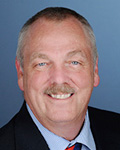 10:30 a.m. — Dr. William Picking, School of Pharmacy, “A Brief History of Vaccinology.” This discussion will provide a summary of the history of vaccines and what goes into making an effective vaccine. We will begin in Asia in the 15th century and then forward to 1796 and the demonstration of what is considered the first true vaccine. Then we’ll look at the work of Louis Pasteur and his contemporaries in the late 19th century. As we progress into the 20th century, we will learn about the vaccine breakthroughs and important missteps that have shaped the way we create — and approve — vaccines today. We will learn about the different types of vaccines now in use and the important additives that make a vaccine stable and effective. Finally, we’ll look at breakthrough vaccine technologies that have been brought to bear upon the SARS-2 COVID pandemic. We will end with some considerations of future vaccines and the medical hurdles they may allow us to overcome.
10:30 a.m. — Dr. William Picking, School of Pharmacy, “A Brief History of Vaccinology.” This discussion will provide a summary of the history of vaccines and what goes into making an effective vaccine. We will begin in Asia in the 15th century and then forward to 1796 and the demonstration of what is considered the first true vaccine. Then we’ll look at the work of Louis Pasteur and his contemporaries in the late 19th century. As we progress into the 20th century, we will learn about the vaccine breakthroughs and important missteps that have shaped the way we create — and approve — vaccines today. We will learn about the different types of vaccines now in use and the important additives that make a vaccine stable and effective. Finally, we’ll look at breakthrough vaccine technologies that have been brought to bear upon the SARS-2 COVID pandemic. We will end with some considerations of future vaccines and the medical hurdles they may allow us to overcome.
Dr. Picking is a native of Abilene, Kansas. He has a BS degree in microbiology from Kansas State University and a Ph.D. in microbiology from KU. He trained in the Department of Chemistry & Biochemistry as a postdoctoral fellow at the University of Texas at Austin. His first faculty position was in the Biology Department at Saint Louis University. He then served on the microbiology faculty at KU until 2009, when he became head of the Microbiology Department at Oklahoma State University before returned to KU to become a Foundation Professor in the Pharmaceutical Chemistry Department in 2014. His current research focuses on the molecular mechanisms used by bacterial pathogens to cause disease in humans. He collaborates closely with his wife, Dr. Wendy Picking, to develop protein-based vaccines against bacterial pathogens that are important in human and animal health.
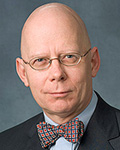 1 p.m. — Dr. Robert C. Rowland, “Donald Trump’s Rhetoric in American Democracy.” Dr. Rowland will describe how Trump’s rhetorical pattern evolved over the course of his presidency and the 2020 campaign, and explain why Trump’s rhetoric resonated so strongly with his core supporters. He will demonstrate that, unlike eloquent presidents of both parties such as Ronald Reagan and Barack Obama, who laid out coherent ideological perspectives and presented optimistic retellings of the American Dream, Trump’s rhetoric resonated from his ability to create an emotional connection with supporters. Finally, Dr. Rowland will sketch the dangers that Trump’s nationalist populist rhetoric poses for American Democracy.
1 p.m. — Dr. Robert C. Rowland, “Donald Trump’s Rhetoric in American Democracy.” Dr. Rowland will describe how Trump’s rhetorical pattern evolved over the course of his presidency and the 2020 campaign, and explain why Trump’s rhetoric resonated so strongly with his core supporters. He will demonstrate that, unlike eloquent presidents of both parties such as Ronald Reagan and Barack Obama, who laid out coherent ideological perspectives and presented optimistic retellings of the American Dream, Trump’s rhetoric resonated from his ability to create an emotional connection with supporters. Finally, Dr. Rowland will sketch the dangers that Trump’s nationalist populist rhetoric poses for American Democracy.
Dr. Rowland teaches rhetoric and argumentation at KU. His more than 100 published essays have appeared in Quarterly Journal of Speech, Rhetoric and Public Affairs, and other journals. He has won several national awards for his articles and for his research program in argumentation and political rhetoric. He has published four University Press books. His most recent, “The Rhetoric of Donald Trump: Nationalist Populism and American Democracy,” came out this spring. He is a former editor of the Western Journal of Communication and presented the keynote on rhetoric at the Reagan Centennial. He is a former director of forensics at KU and Baylor University. As a KU student in 1976, Dr. Rowland and his debate colleague won the National Debate Tournament.
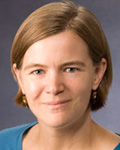 10:30 a.m. — Dr. Molly Zahn, Religious Studies Department, “The Dead Sea Scrolls and Why They Matter.” The Dead Sea Scrolls have been called the most important archaeological discovery of the 20th century, revolutionizing our understanding of the development of the Bible and of Judaism prior to the time of Jesus. This talk will introduce these fascinating ancient texts and discuss some of the cutting-edge research that is changing our understanding of the culture out of which two major world religions emerged.
10:30 a.m. — Dr. Molly Zahn, Religious Studies Department, “The Dead Sea Scrolls and Why They Matter.” The Dead Sea Scrolls have been called the most important archaeological discovery of the 20th century, revolutionizing our understanding of the development of the Bible and of Judaism prior to the time of Jesus. This talk will introduce these fascinating ancient texts and discuss some of the cutting-edge research that is changing our understanding of the culture out of which two major world religions emerged.
Molly Zahn, professor of religious studies, has been teaching at KU since 2008. A native of Wisconsin, she studied at Minnesota, Oxford, and Notre Dame before arriving in Lawrence. Her research focuses on the composition and interpretation of sacred texts in early Judaism, as attested in the Hebrew Bible and the Dead Sea Scrolls. Dr. Zahn is the author of “Genres of Rewriting in Second Temple Judaism” (Cambridge, 2020), as well as an earlier book and numerous articles. She currently serves as executive editor of the prestigious Qumran journal Dead Sea Discoveries.
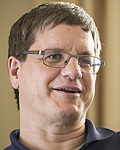 1 p.m. — Prof. Brian McClendon, Engineering Department, “Autonomous Driving — How It Works and the Risks/Benefits.” McClendon will cover the current self-driving car industry and how close we are to seeing self-driving cars in our neighborhood. He’ll give an overview of how they work, explaining machine learning and computer vision/sensing, and finally cover some of the risks and benefits of the technology.
1 p.m. — Prof. Brian McClendon, Engineering Department, “Autonomous Driving — How It Works and the Risks/Benefits.” McClendon will cover the current self-driving car industry and how close we are to seeing self-driving cars in our neighborhood. He’ll give an overview of how they work, explaining machine learning and computer vision/sensing, and finally cover some of the risks and benefits of the technology.
Brian McClendon is a research professor at KU. For 15 years, he was a vice-president with Google and led the entire Geo business unit building Google Maps, Street View and Google Earth. In 2013, he was given the United Nations “Champions of the Earth” award for his work on Google Earth. He was inducted into the National Academy of Engineering in 2015 and holds an honorary doctorate in electrical engineering from KU. In 2018, he ran for Kansas Secretary of State. He also founded KSVotes.org, which has helped more than 100,000 Kansans register to vote or request an advance ballot. He holds 23 patents.
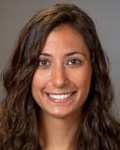 10:30 a.m. — Dr. Elaina Sutley, School of Engineering, “Learning From Disaster — an Integrated Engineering and Social Science Approach.” In 2020 — our country’s most expensive year on record for disasters — 22 severe storms, hurricanes, floods, tornadoes, wildfires and droughts together caused more than $450 billion in damage. The frequency of these disasters is increasing. This lecture will cover principles of disaster resilience, some examples of recent Kansas disasters, and how engineers, social scientists and others learn from disasters.
10:30 a.m. — Dr. Elaina Sutley, School of Engineering, “Learning From Disaster — an Integrated Engineering and Social Science Approach.” In 2020 — our country’s most expensive year on record for disasters — 22 severe storms, hurricanes, floods, tornadoes, wildfires and droughts together caused more than $450 billion in damage. The frequency of these disasters is increasing. This lecture will cover principles of disaster resilience, some examples of recent Kansas disasters, and how engineers, social scientists and others learn from disasters.
Dr. Sutley, an associate professor in structural engineering, obtained her Ph.D. from Colorado State University in 2015. Her research focuses on community disaster resilience, with more than 70 publications on that topic. She was recently featured in the PBS Terra series “Weathered” for her research on the May 28, 2019, Linwood, Kan., tornado. She chairs two national-level technical committees, and teaches courses on structural analysis, timber structure design, and resilient structures at KU.
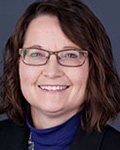 1 p.m. — Prof. Jean Phillips, Law School, “Wrongful Convictions — Causes and Solutions.” According to the Nation Innocence Network, approximately 7% of prisoners in the United States are innocent. That’s 210 people in just the State of Kansas. Nationally, the estimate is just under 30,000 people. This course discusses the causes of wrongful convictions, explores the legal difficulties in freeing those who are actually innocent, and provides solutions to help prevent the conviction of innocent persons.
1 p.m. — Prof. Jean Phillips, Law School, “Wrongful Convictions — Causes and Solutions.” According to the Nation Innocence Network, approximately 7% of prisoners in the United States are innocent. That’s 210 people in just the State of Kansas. Nationally, the estimate is just under 30,000 people. This course discusses the causes of wrongful convictions, explores the legal difficulties in freeing those who are actually innocent, and provides solutions to help prevent the conviction of innocent persons.
Prof. Phillips joined the KU School of Law in 1996 and became the director of the Paul E. Wilson Project for Innocence and Post-Conviction Remedies in 1999. The Project is a law school clinic where law students, under attorney supervision, represent state and federal prisoners in appellate and post-conviction litigation in state and federal courts. Prof. Phillips is also the director of clinical programs at KU Law. In addition to supervising and teaching in the Project for Innocence, she teaches criminal procedure and criminal practice in Kansas.
 10:30 a.m. — Paul Schumaker, political science professor emeritus, “Electoral College Reform, Communitarian Ballots, and the Next Stage of American Democracy.” America has witnessed several forms of democracy. Initially, we were an aristocratic republic, and the Electoral College worked to elevate leading statesmen to the presidency. But subsequent stages of democratization have produced both mediocre politicians and charismatic authoritarians as presidents. The Electoral College no longer serves its most basic function. Reforms have long been proposed, but Schumaker will argue that such reforms are insufficient. He will outline more comprehensive reforms that require a constitutional amendment. State-level primaries would be replaced with a national preliminary election. Approval ballots employed in this election would allow citizens to indicate their approval or disapproval of the leading presidential candidates. In the subsequent general election, citizens would be given rank-order ballots listing only the most widely approved candidates, and they would indicate their priorities among such candidates. Winning candidates would be widely trusted and have values corresponding to those of as many citizens as possible.
10:30 a.m. — Paul Schumaker, political science professor emeritus, “Electoral College Reform, Communitarian Ballots, and the Next Stage of American Democracy.” America has witnessed several forms of democracy. Initially, we were an aristocratic republic, and the Electoral College worked to elevate leading statesmen to the presidency. But subsequent stages of democratization have produced both mediocre politicians and charismatic authoritarians as presidents. The Electoral College no longer serves its most basic function. Reforms have long been proposed, but Schumaker will argue that such reforms are insufficient. He will outline more comprehensive reforms that require a constitutional amendment. State-level primaries would be replaced with a national preliminary election. Approval ballots employed in this election would allow citizens to indicate their approval or disapproval of the leading presidential candidates. In the subsequent general election, citizens would be given rank-order ballots listing only the most widely approved candidates, and they would indicate their priorities among such candidates. Winning candidates would be widely trusted and have values corresponding to those of as many citizens as possible.
Prof. Schumaker was born and raised in Wisconsin, attaining a Ph.D. in political science from Madison in 1973. Before retiring four years ago, he was a professor of political science at KU for 45 years. During those years, his teaching and research focused on American democracy, both in theory and practice. He also was chair of political science for ten years and a distinguished instructor of Western Civilization for six years. He is the author of the 2020 book, “The Twenty-Eighth Amendment? Beyond Abolishing the Electoral College.”
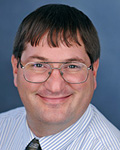 1:00 p.m. — Kyle Camarda, associate professor of chemical and petroleum engineering, “Chess and the Cold War.” The Cold War was a grand conflict of ideologies, and the Soviet Union and the U.S. competed for dominance in many arenas. The chess world was one of them. This lecture will discuss the fascinating people, places and events in that world during this geopolitically intense time, when Cold War politics and chess were tightly intertwined.
1:00 p.m. — Kyle Camarda, associate professor of chemical and petroleum engineering, “Chess and the Cold War.” The Cold War was a grand conflict of ideologies, and the Soviet Union and the U.S. competed for dominance in many arenas. The chess world was one of them. This lecture will discuss the fascinating people, places and events in that world during this geopolitically intense time, when Cold War politics and chess were tightly intertwined.
Prof. Camarda has been active in the chess community for nearly 40 years as a player (K-State champion in 2002), tournament director, club president, faculty advisor and coach. His teams have won numerous championships. He has a strong interest in chess history and has taught many chess seminars to KU freshmen.
